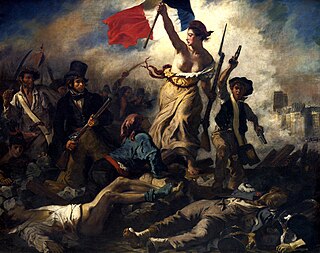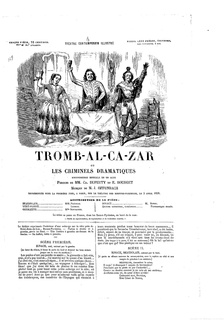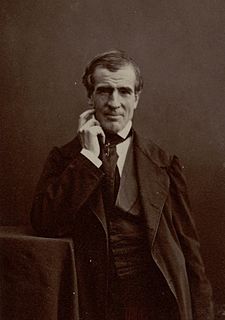Life
In 1809 he entered the École militaire de Saint-Cyr and became second lieutenant. He was then sent to garrison at Milan and took part to the last campaigns of the Empire. Captain, he was captured at the battle of the Mincio River on 8 February 1814. Captain of staff during the Hundred Days, he served at Grenoble then participated to the battle of Waterloo and battle of Ligny where he gained the rank of battalion chief.
The École spéciale militaire de Saint-Cyr is the foremost French military academy – often referred to as Saint-Cyr – located in Coëtquidan in Guer, Morbihan, Brittany, along with the École militaire interarmes. Its motto is Ils s'instruisent pour vaincre, literally meaning "They study to vanquish" or, more freely put, "Training for victory". French cadet officers are called saint-cyriens or cyrards.

Milan is a city in northern Italy, capital of Lombardy, and the second-most populous city in Italy after Rome, with the city proper having a population of 1,372,810 while its metropolitan area has a population of 3,244,365. Its continuously built-up urban area has a population estimated to be about 5,270,000 over 1,891 square kilometres. The wider Milan metropolitan area, known as Greater Milan, is a polycentric metropolitan region that extends over central Lombardy and eastern Piedmont and which counts an estimated total population of 7.5 million, making it by far the largest metropolitan area in Italy and the 54th largest in the world. Milan served as capital of the Western Roman Empire from 286 to 402 and the Duchy of Milan during the medieval period and early modern age.

The First French Empire, officially the French Empire, was the empire of Napoleon Bonaparte of France and the dominant power in much of continental Europe at the beginning of the 19th century. Although France had already established an overseas colonial empire beginning in the 17th century, the French state had remained a kingdom under the Bourbons and a republic after the Revolution. Historians refer to Napoleon's regime as the First Empire to distinguish it from the restorationist Second Empire (1852–1870) ruled by his nephew as Napoleon III.
Dismissed, degraded and put on half pay under Louis XVIII, he then embarked on literature and collaborated to numerous magazines : Revue et gazette des théâtres, La Minerve , L'Abeille, L'Indépendant, La Boussole politique, La Pandore, Le Siècle, Les Salons de Paris, les Annales de l'école française et des beaux-arts etc.

Louis XVIII, known as "the Desired", was a monarch of the House of Bourbon who ruled as King of France from 1814 to 1824, except for a period in 1815 known as the Hundred Days. He spent twenty-three years in exile, from 1791 to 1814, during the French Revolution and the First French Empire, and again in 1815, during the period of the Hundred Days, upon the return of Napoleon I from Elba.
La Minerve, later La Minerve française, was a daily French newspaper first published on 1 April 1818. Liberal and in favour of the Charte constitutionnelle, it was suspected under the Bourbon Restoration of being the organ of Bonapartists and Republicans. Its main editors were Benjamin Constant, Louis-Antoine Garnier-Pagès, Louis-Antoine Garnier-Pagès, Victor-Joseph Étienne de Jouy, Étienne Aignan, and the singer Béranger, Évariste Dumoulin, Antoine Jay, Pierre Louis de Lacretelle, Pierre-François Tissot.
His poems and songs directed against the Bourbon earned him six months' imprisonment. He was particularly active in the Trois Glorieuses, was awarded the croix de juillet and was returned his Légion d'honneur. He was also reinstated as battalion commander of the National Guard of Paris, a position he would leave in 1834.

The French Revolution of 1830, also known as the July Revolution, Second French Revolution or Trois Glorieuses in French, led to the overthrow of King Charles X, the French Bourbon monarch, and the ascent of his cousin Louis Philippe, Duke of Orléans, who himself, after 18 precarious years on the throne, would be overthrown in 1848. It marked the shift from one constitutional monarchy, under the restored House of Bourbon, to another, the July Monarchy; the transition of power from the House of Bourbon to its cadet branch, the House of Orléans; and the replacement of the principle of hereditary right by popular sovereignty. Supporters of the Bourbon would be called Legitimists, and supporters of Louis Philippe Orléanists.
In 1832 he was awarded a medal of the city of Paris for his bravery during the cholera epidemic.
Managing director of the Théâtre Saint-Marcel (1839), then of the Théâtre de l'Ambigu (1840-1849), in 1849 he became director of the prison of Belle-Isle en mer (1849-1850).
His plays were performed on the most important Parisian stages, including: Théâtre de l'Ambigu, Théâtre de la Gaîté, Théâtre de la Porte-Saint-Martin, and Théâtre de l'Odéon.

A play is a form of literature written by a playwright, usually consisting of dialogue or singing between characters, intended for theatrical performance rather than just reading. Plays are performed at a variety of levels, from Broadway, Off-Broadway, regional theater, to Community theatre, as well as university or school productions. There are rare dramatists, notably George Bernard Shaw, who have had little preference as to whether their plays were performed or read. The term "play" can refer to both the written texts of playwrights and to their complete theatrical performance.

The Théâtre de la Gaîté, a former Parisian theatre company, was founded in 1759 on the boulevard du Temple by the celebrated Parisian fair-grounds showman Jean-Baptiste Nicolet as the Théâtre de Nicolet, ou des Grands Danseurs. The company was invited to perform for the royal court of Louis XV in 1772 and thereafter took the name of Grands-Danseurs du Roi. However, with the fall of the monarchy and the founding of the First French Republic in 1792, the name was changed to the less politically risky Théâtre de la Gaîté. The company's theatre on the boulevard du Temple was replaced in 1764 and 1808, and again in 1835 due to a fire. As a result of Haussmann's renovation of Paris, the company relocated to a new theatre on the rue Papin in 1862, and the 1835 theatre (pictured) was subsequently demolished.
This page is based on this
Wikipedia article Text is available under the
CC BY-SA 4.0 license; additional terms may apply.
Images, videos and audio are available under their respective licenses.
Armand-François Jouslin de La Salle, was a French lawyer, journalist, dramatist and theatre director. Jouslin de La Salle was administrator of the Comédie-Française from 1832 to 1837, and then of the théâtre des Variétés in 1839.
Ferdinand Laloue was a French dramatist, librettist and theatre producer.

Charles Désiré Dupeuty, was a 19th-century French librettist and playwright.
Jean-Constant Menissier was a 19th-century French playwright. His theatre plays were performed on the most important Parisian stages of the 19th century: Théâtre du Gymnase, Théâtre de la Porte-Saint-Martin, Théâtre des Célestins, Théâtre du Vaudeville etc.
Amable Vilain de Saint-Hilaire was a French dramatist whose plays have been performed on the most important Parisian stages of the 19th century: Théâtre du Vaudeville, Théâtre des Variétés, Théâtre de la Renaissance etc.

Jean-Toussaint Merle was a French playwright and journalist.
Théodore Anne was a French playwright, librettist, and novelist.

Ferdinand de Villeneuve was a 19th-century French playwright.
Armand d'Artois was a 19th-century French playwright and librettist, and also Achille d'Artois's brother.
Saint-Yves was the pen name of Édouard Déaddé, a 19th-century French playwright.

Pierre Michel Delaporte was a 19th-century French playwright, painter, lithographer and political caricaturist.
Charles Joseph Édouard Potier, called Charles was a 19th-century French actor and playwright.
Antoine Simonnin, full name Antoine-Jean-Baptiste Simonnin, was a 19th-century French writer and dramatist.
Benjamin Antier, real name Benjamin Chevrillon,, was a 19th-century French playwright.
Théodore Nézel was a 19th-century French playwright and librettist.
Henry Villemot (c.1796-1870) was a 19th-century French playwright.
Emmanuel François Varez called E. F. Varez was an early 19th-century French playwright and novelist.
Armand Joseph Overnay was a 19th-century French chansonnier and playwright.
Bernard Lopez de Roberts was a 19th-century French playwright of Spanish origin.
Charles-Louis-François Desnoyer, or Desnoyers, was a 19th-century French actor, playwright and theatre manager.









